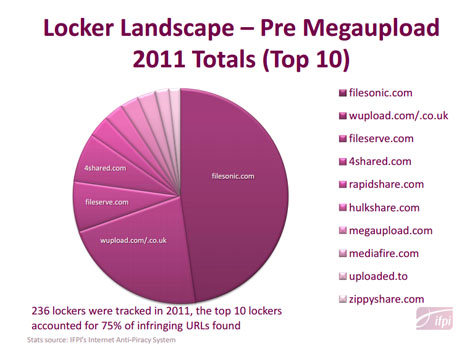IFPI, the International Federation of the Phonographic Industry, is a music industry group that represents 1,400 publishers worldwide. Recently a IFPI study, conducted by their Head of Internet Anti-piracy Operations, was leaked on their website which provided insights such as piracy activity on the Internet, techniques used by pirates to gain access to content, and methods used by IFPI to catch pirates. One of the more interesting parts of the report revolve around a graph that shows which file locker websites (i.e. websites that allow users to upload and store files, which can then be downloaded or shared) contain the most infringing URLs (links that allowed users to download pirated content).
According to that graph (see image above), Megaupload is number seven on the list of lockers with the most infringing URLs despite Megaupload being the largest file locker at the time. In other words, Megaupload had the most traffic compared to the competition but it contained less pirated content than the other locker websites.
Kim Dotcom, the ex-CEO/CEO of Megaupload, told ArsTechnica this data ‘vindicates’ Megaupload and proves Megaupload actively worked to take down infringing links:
“All the other file hosters in this list were significantly smaller than Megaupload. Megaupload had 1.5 terabits of bandwidth utilization before it was shut down. The next largest, RapidShare, had only about 800 gigabits.
If the largest file hoster in the world does not represent a significant percentage of infringing URL’s found by IFPI, this can only lead to one conclusion,. Megaupload was very effective in taking infringing links down.
What this statistic clearly shows is that we were a good corporate citizen and had a solid takedown policy. We had an average takedown time of 3 hours based on all takedown requests in the history of Megaupload. We also had 180 takedown partners with direct delete access and they have removed links instantly, millions of them.”
It is interesting that Dotcom brings up the direct delete access capability of Megaupload because, as ArsTechnica points out, this direct delete access capability is one the main reasons why Megaupload was brought down by the Feds. According to the authorities, Megaupload limited the number of times content owners could delete pirated content through this direct delete feature. For example, Time Warner was limited to 2,500 deletions per day until they requested an increase and was granted 5,000 by Dotcom.
At this time the fight between Megaupload and the USA and New Zealand governments is like a seesaw, going back and forth. Only time will tell who is the victor but one thing is certain: This case will serve as a landmark precedent for the reach, or lack thereof, of the American government on foreign companies and citizens.
[via ArsTechnica]

 Email article
Email article




